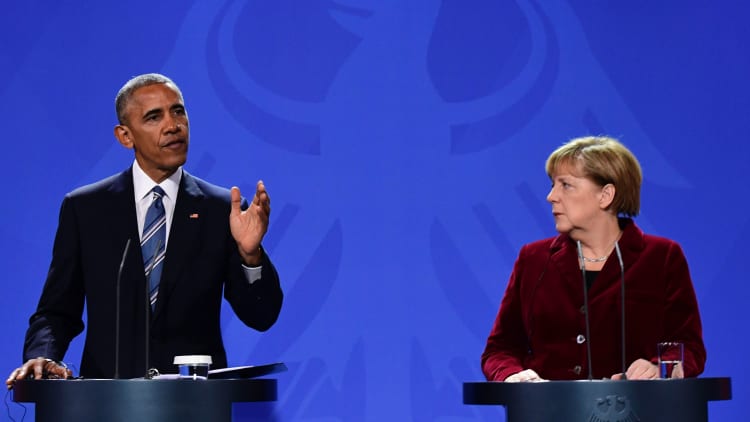Angela Merkel who has steered Germany through several global crises as its first woman leader, says she will seek a fourth term as Germany's chancellor in general elections next year.
Speaking after a meeting with high-ranking members of her center-right party, Merkel told reporters Sunday night that "I literally thought about this decision endlessly ... but I am ready to run for office again."
If the 62-year-old Merkel wins next year and serves the entire four-year term, she would match her one-time mentor Helmut Kohl's post-war record of 16 years in office.
The conservative is widely seen as a stabilizing force in Europe at a time of uncertainty after Britain's vote to leave the European Union and the election of Donald Trump as the next U.S. president.
A pragmatist, Merkel has steered Europe's biggest economy through the financial crisis and the euro zone debt crisis and has won respect internationally - U.S. President Barack Obama on Thursday described her as an "outstanding" ally.
However, her decision last year to open Germany's borders to around 900,000 migrants, mostly from war zones in the Middle East, angered many voters and hit her personal ratings.
Her party has slumped in regional elections in the last year while support for the anti-immigrant Alternative for Germany (AfD) has swelled.
In September, after a heavy defeat for the CDU in a Berlin state election, a humbled Merkel surprised the country by saying she wished she could turn the clock back on the migrant crisis, though she stopped short of saying her policy was a mistake.

Inscrutable Merkel, who grew up in Communist East Germany, is something of a loner. A physicist who only became involved in politics after the fall of the Berlin Wall in 1989, she is seen as a talented negotiator but has also shown a ruthless streak.
A Protestant woman in a mainly Catholic and male-dominated party, at least when she became its leader in 2000, Merkel never built up a regional power base but over the years she has rid herself of her main male rivals and has no obvious successor.
She still requires the backing of her Christian Social Union (CSU) allies in Bavaria, who have fiercely criticized her open-door migrant policy but, with no obvious candidate of their own, are widely expected to fall in behind her.
Polls put her conservative bloc around 10 points ahead of its nearest rivals, the Social Democrats (SPD), with whom she shares power. Many pollsters see another 'grand coalition' as the most likely option after the September election, although the rise of the AfD makes coalition arithmetic more complicated.
By standing again, Merkel could end up matching the 16 years in office of her former mentor, Helmut Kohl. It was Merkel herself who broke with Kohl and told her party in 1999, in the midst of a funding scandal, that it should move on without him.
It is unclear whether, if she wins a fourth term, she would serve a full four years.

